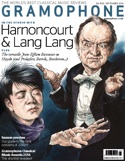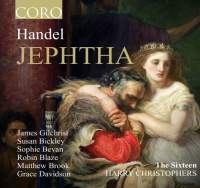Texte paru dans: / Appeared in: |
|
|
Reviewer:
David
Vickers Jephtha (1752) dramatises the folly, pride and penitence of the Hebrew general who rashly vows to Jehovah that if his army is blessed with victory against the Ammonites he will sacrifice the first thing he sees upon returning home; it turns out to be his only daughter Iphis, and so the beleaguered Jephtha finds himself in conflict with everyone else around him (and also with his own conscience) while he confronts what seems like unavoidable tragedy. James Gilchrist conveys affable nonchalance in the early stages (graceful melismatic singing in ‘Virtue my soul shall still embrace’), and aptly characterises Jephtha’s deepening emotional responses to the unfolding tragedy, such as hopeless despair in the extraordinary accompanied recitative ‘Deeper and deeper still, thy goodness, child, pierceth a father’s bleeding heart’; his sublime sotto voce singing in the da capo repeat of ‘Waft her, angels, to the skies’ tenderly conveys Jephtha’s heartbroken preparations for the sacrifice of Iphis, although overly prominent plucking from theorbo and harp (which has no place in this oratorio), soporific organ continuo and an over-deliberate slowing of the tempo all distracted my ears from Gilchrist’s supremely accomplished singing. Sophie Bevan’s Iphis is endearingly naive in ‘Tune the soft melodious lute’ (the theorbo and anachronistic harp briefly won me over), whereas her modest resignation to a tragic doom is profoundly moving (‘Farewell, ye limpid springs and brooks’). Storgè’s ‘In gentle murmurs will I mourn’ is sung with delectable softness by Susan Bickley, who later seems a tad underpowered when having to deliver extreme agitated emotions of inexplicable anxiety (‘Scenes of horror’) and then turbulent anger at her husband’s foolishness (‘Let other creatures die’). Robin Blaze performs Hamor’s ‘Dull delay, in piercing anguish’ with subtle finesse and sensitivity for words. An appendix presents Matthew Brook singing Zebul’s 1753 addition ‘Freedom now once more possessing’; it is a pity that the appendix does not also include Iphis’s last aria, which almost always gets dropped in favour of the quintet by JC Smith that replaced it in the 1756 revival.
The orchestra play
excellently, although just two cellos and one double bass struggle to fully
realise the expressive sonorities, rhetorical momentum and muscular vigour
needed for bass-driven moments such as the dance-like climax to the first chorus
‘No more to Ammon’s god and king’. The Sixteen sing with their customary
neatness, sweetness or agility. The choir do not sound excited enough at the
miraculous interventions of warrior angels in battle (‘Cherub and seraphim,
unbodied forms’), but the chorus of virgins welcoming Jephtha home (‘Welcome
thou, whose deeds conspire’) is so prettily done that it makes the warrior’s
baleful reaction all the more disturbing. ‘How dark, O Lord, are thy decrees’,
from its broodily mysterious opening to its stoical conclusion ‘whatever is, is
right’ (a quotation from Alexander Pope’s Essay on Man), is given the most
satisfyingly nuanced choral performance I have heard. |
|
|
|
|
|
Cliquez l'un ou l'autre
bouton pour découvrir bien d'autres critiques de CD |
|




